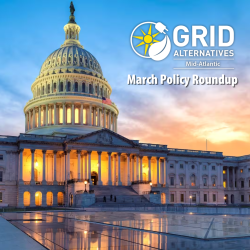Along with renewable energy, energy efficiency can be a life-changing resource.
Solar panels attract attention. They're shiny, sleek, and futuristic. They might even start a conversation with a neighbor or a visiting family member: "Are your solar panels bringing down your emissions and energy bills?"
Just as important are energy-efficiency upgrades, which are often invisible (unless someone notices your new appliances). Improving weatherization and insulation can save homeowners hundreds of dollars in energy costs each year, especially in old or gas-heated homes.
The Healthy Homes Act, which awaits approval from the D.C. Council, would lower energy costs to help sustain Black homeownership in the District. It would also reduce the number of local homes heated by gas, which creates numerous health problems. Let's talk more about how energy efficiency can promote community health, especially when paired with renewable energy. Visible and invisible forces can be powerful.
District of Columbia
The D.C. Council has a lot of tasks on its plate that will set the course for the District’s energy future.
At a recent agency oversight hearing, GRID Mid-Atlantic offered testimony to highlight the importance of always putting communities first. Our deep experience in our region exemplifies how programs that are designed and implemented for the community must also be designed and implemented with the community. This community leadership will only become more essential as more funds begin to flow through local agencies from the federal Inflation Reduction Act.
A big shout-out goes to our coalition allies Beyond Gas DC for pushing the Council to advance the Healthy Homes Act. This bill would complement solar deployment with a program to install electric appliances for low and moderate-income households, further helping to reduce outsized energy bill burdens. The Healthy Homes Act passed the Committee on Transportation and the Environment last week. It’s now time for it to head to the Council as a whole.
In other D.C. news, GRID Mid-Atlantic supports the Environmental Justice Amendment Act to create cumulative impact assessment requirements to protect our communities. This bill has a hearing scheduled for later this month.
Maryland
Maryland’s 2024 legislative session is ongoing through April 8. Legislators are tackling many clean energy issues, large and small, to help get the state on track to meet its nation-leading clean energy goals while promoting economic and environmental justice. A variety of bills address topics like funding resilient infrastructure upgrades, enhancing incentives for rooftop and community solar and storage projects benefiting income-qualified households, streamlining solar permitting, and making sure Maryland’s electric vehicle (EV) transition is equitable.
Virginia
GRID Mid-Atlantic is pleased that legislation to expand Virginians’ access to solar leases has passed both chambers of the Virginia General Assembly and awaits the Governor’s approval. Expansions of community solar in the Commonwealth are also moving forward to the Governor’s desk!
With all this momentum, we have our fingers crossed for the establishment of a Clean Energy Innovation Bank that would leverage federal and private funding to finance equitable solar and storage projects.
Sadly, bills to hold utilities more accountable for interconnection costs and processes and to rein in their usage of ratepayer funds for lobbying and campaign donations did not survive this year’s all-too-short legislative session.
Federal
News on the Inflation Reduction Act (IRA): Federal agencies continue to implement rules and programs established by the IRA, which dedicates hundreds of billions of dollars toward more rapid and equitable climate action, especially with respect to solar and other clean energy technologies. GRID Mid-Atlantic, in turn, is working to help make sure these funds truly benefit our communities.
New tax rules from the IRS, for example, expand clean energy incentives to community-based organizations that previously could not access those incentives directly. Crucially, they also boost incentives for solar and storage projects in and for underserved communities.
Other new rebate rules from the Department of Energy will soon allow households to benefit even more from solar when they electrify their heating and cooling, appliances, and vehicles and power them with the sun.
Navigating these rules can be challenging for many of the intended beneficiaries. GRID Mid-Atlantic’s experience and engagement with the rule-making processes help us support our clients and communities in making the most of these opportunities.
In addition, our local jurisdictions have also all recently submitted Priority Climate Action Plans, making them eligible to apply for additional implementation funds pursuant to the Environmental Protection Agency’s Climate Pollution Reduction Grants (CPRG) program. This program, also enacted under IRA, will provide a total of $5 billion to states, local governments, tribes, and territories. We look forward to supporting the District’s, Maryland’s, and Virginia’s ambitions to ensure all their residents see the bill savings and other benefits of renewable energy.

